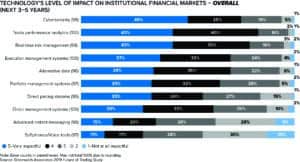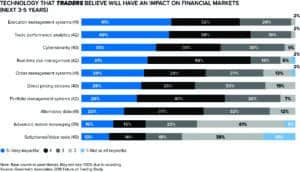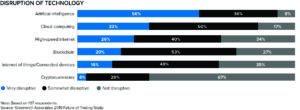In partnership with Refinitiv, Greenwich Associates has conducted a survey of capital markets trends with a specific focus on technology, the data explosion and the skills that will be necessary for future success.
In the first of three reports, we look at the impact of technology on the trading desk of the future. Some 78% of respondents believe technology has made financial markets better and more efficient. While not unexpected, this finding serves to strengthen our conviction that the fintech revolution is set to continue apace, and that innovation will have an ongoing and significant impact on financial markets over the next few years.
The detailed responses, however, identified differing opinions and interesting insights into exactly where and how market participants expect technology to have the greatest impact over a three-to-five-year period.
Trading desk of the future: market view
Capital markets respondents expect long-term, defensive solutions to have the most impact over this timeframe, with 49% (the highest percentage) selecting cybersecurity as “very impactful” (see Figure 1). This was closely followed by 43% selecting real-time risk management and trade performance analytics. However, trade performance analytics ranked highest across all categories when “impactful” and “most impactful” scores were combined.
It’s clear that solutions focused on cybersecurity, real-time risk management, and trade performance analytics will all be critical to the success of trading desks in the coming years.

Figure 1
Trading desk of the future: traders’ view
But when traders were asked which technologies will have the most impact on markets over the same timeframe, we saw different results (see figure 2). Execution management systems (EMS) topped the list with 41%, closely followed by trade performance analytics at 40% and cybersecurity (35%).
The EMS is the trader’s window to the world and the single most critical tool needed to succeed in that seat. Even if it is, in fact, artificial intelligence, data mining or cloud computing that is actually providing a trader with the tools needed to win, it is the EMS that makes these underlying technologies functional and available.

Figure 2
The disruptive potential of artificial intelligence
According to 56% of respondents, artificial intelligence (AI) will be the most potentially disruptive technology over the next three-to-five-years (see Figure 3). Many market participants are already harnessing the power of AI, with 44% using AI/machine learning in their trading processes and a further 17% saying that they plan to incorporate it over the next 12 to 24 months.
Of note, 80% expect AI/machine learning to be fully embedded in trading processes within the next three to five years. With only 44% actively using these solutions today, we can expect to see significant change in the coming years.
Data availability remains a significant challenge in the AI arena. Whereas the biggest global technology firms can access vast quantities of data with ease, most financial services firms must make do with limited datasets. Moreover, they must remain cognisant of the stringent privacy regulations that govern the use of customer data, often hindering the progress of AI initiatives.

Figure 3
Trading technology innovation
Technology and innovation have contributed to greater efficiency and a better customer experience, while more readily available data and complex analytics have enabled greater transparency and better price decisions. As a result, the firms that can effectively and consistently aggregate and normalise huge quantities of data are now extremely valuable.
The future of trading is indelibly intertwined with trading technology innovation, and the real edge will be gained, maintained or lost based on how technology is deployed and put to work.
The future of trading survey
More than 100 capital markets professionals across the globe participated in our online study. Respondents were drawn from across firm types, including the buy-side, technology vendors, broker-dealers, consultants/industry groups, exchanges/trading venues and more. The survey respondents also spanned a wide range of generations.
Looking ahead, we will continue this series by examining the data explosion and what this means for future workflows, and finally, how the relationships between trading professionals are evolving.
- Read our full report ‘The Future of Trading: Technology in 2024’ at refinitiv.com
